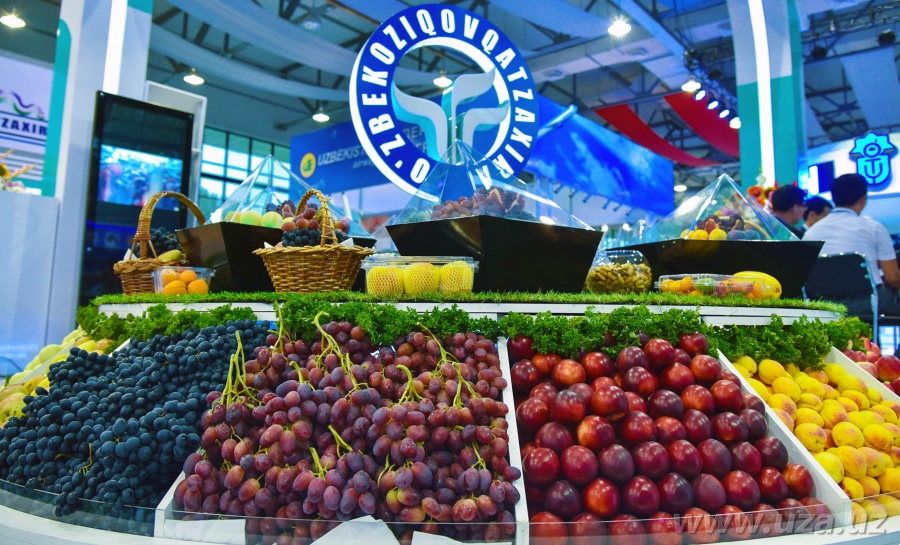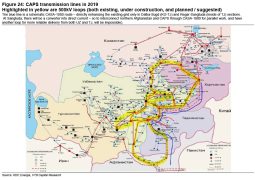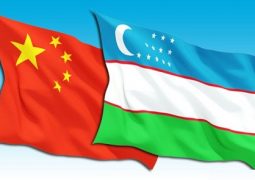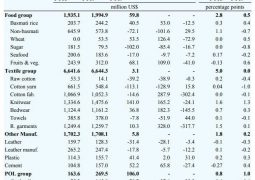“Green Corridor”

Uzbekistan has been rapidly expanding its presence in the food markets of the CIS, Europe and the Middle East. The country’s agro-industrial complex has a great potential, the realization of which to the full would provide not only the traditional partners, but also the most distant corners of the globe with environment friendly and safe food. Uzbekistan Today reporters have explored the main trends in the development of this segment in the framework of the International Fruit and Vegetable Fair in Tashkent.
In Good Taste
Uzbekistan is currently the Central Asia’s largest producer of fruits and vegetables. Over 70,000 farms across the country specialize in growing ‘sunny’ fruits and vegetables, introduce integrated water resources management, up-to-date processing mini-technologies, automated control and quality management systems.
This is the reason why the republic initiated the establishment of a kind of a common platform for contracting fresh and processed fruit and vegetable products, which would bring all participants of the sector together. A similar event has been successfully organized for 12 years in the cotton industry, gathering the biggest cotton business players fr om around the world in October in Tashkent.
The extra-schedule International Fruit and Vegetable Fair this July in Tashkent was a kind of a rehearsal for the big event. It resulted in 270 contracts for exportation of fruit and vegetables worth more than $2 billion: vegetables made up 27% of exported goods, grapes accounted for 25%, fruits took 20%, dried and processed products – 17.6%, beans – 8.4%, and melons – 2%.
Despite the fact that it was the first step for Uzbekistan in organizing such a big forum in the fruit and vegetable sector, the new trade fair hosted more than 300 foreign participants – heads and representatives of reputable international organizations and state structures of the partner countries, flagship foreign companies, trade networks, processors, transport and logistics centers, banks and financial institutions, researchers, analysts and practitioners in the field of production and exports of fruits and vegetables.
It is important to realize that they are responsible for the lion’s share of supplies of fruit and vegetable products in the CIS, Asia, Europe and the Middle East. All of them, despite busy schedule, came to Tashkent, proving and acknowledging its capacity in this area, as well as quality and taste parameters of Uzbek fruits and vegetables, which are now well marketable on world markets.
More than 150 domestic suppliers and processors of fruits from all regions of Uzbekistan presented their products at IFVF. Exhibition halls demonstrated domestically produced fresh, dried and processed fruits, vegetables, melons and legumes, as well as spices.
The diversity of edible masterpieces was impressive: farmers from Surkhandarya covered the glass floor with fruits and vegetables, and a tree right in the middle of the stand was bestrewed with different fruits of unreal sizes. The tree was studded not just with apples, pomegranates, pears, persimmons and quince, but also with huge watermelons, melons and even pumpkins.
Visitors were enchanted by ‘grape chandeliers’, fruit fountains and walls built of fruits and vegetables. Some compositions of delicious vitamin products of Uzbekistan were crowned with peacocks and Humo birds, artfully carved from melons, adding a special color and originality of the East to the exhibition. Hospitality and ‘taste’ of Uzbekistan could be rated at almost every stand. Manufacturers unfolded rich tables and treated every visitor with their sunny products.
Promising Projects
The last IFVF has become an important event not only in terms of contracting products, but also as a determinant for the future development of the agro-industrial complex.
In recent years, Uzbekistan has turned into a major exporter of high quality and competitive fruit and vegetable products. Previously, the republic traditionally delivered them mainly to Russia, Kazakhstan and other CIS countries, while nowadays agricultural products from Uzbekistan are shipped to markets of over 120 countries around the world. In particular, the map of deliveries has expanded by establishing exports to Indonesia, Norway, Mongolia, Saudi Arabia, Slovakia, the USA, Thailand, Japan and other countries.
As emphasized by international experts, exports promise to grow, as Uzbekistan has planned several interesting initiatives in the coming years. By the end of 2020, it is planned to implement 254 investment projects that envisage the establishment of 76 modern processing plants, construction of 155 cold stores, and launch of 23 packaging manufactures.
All the projects will be implemented mainly in rural areas, and specialize in fruit, vegetable and grapes growing. 66 specialized areas have been allocated for projects in each of the regions of Uzbekistan. It is expected that the measures will help to increase the volumes of fruit and vegetable processing in the assigned areas from 18 to almost 30%.
To achieve the abovementioned goals, Uzbekistan adopted a program on the further development of resource capacity, enhanced processing of fruits and vegetables, meat and dairy products, increase of production, and exports of food products by 2020. This program alone provides for implementation of 80 promising projects on enhanced processing, establishment of additional capacities on the production of internationally marketable finished products, as well as establishment of new cold storages and chambers for 325,000 tons. The construction and modernization of over 200 cold storages has been completed, increasing the capacity by 100,000 tons this year alone.
Uzbekistan produced 13 million tons in the first nine months of last year, against more than 15 million tons in the reported period of the current year. The bulk of production is represented by vegetables – 10 million tons, 2 million tons of fruits, 1.2 million tons of grapes, and 1.5 million tons of melons and melon crops. By the end of the year, it is planned to bring the indicators to 21 million tons of fruits and vegetables.
Another important project comes to the creation of a ‘green corridor’, which implies a simplified customs and phytosanitary clearance procedure for fruit and vegetable products that are shipped to Russia. As stated at the IFVF, Uzbekistan and Russia intend to sign a package of documents by the end of November, 2016.
According to experts, the corridor would accelerate the transportation, and increase the volume of direct supplies of fresh and processed fruits and vegetables to final customers in various regions of the Russian Federation. Today, the list of major partners of Uzbekistan in Russia includes Siberian Alliance, Magnit, Perekrestok, Agrolile and X5 Retail Group companies.
Since the beginning of 2016, direct deliveries to the Russian Federation and neighboring countries of the region have tripled, in the Republic of Korea – grew by five times, in the UAE – by 1,8 times, Germany – by 1.6 times. Total exports of fruits and vegetables are estimated to grow by 1.4 times in 2016. In 10 months of 2016, Uzbekistan exported nearly 700,000 tons of agricultural products, and by the end of the year this indicator is expected to reach 1 million tons.
There is another advantage for foreign customers – in early 2017 Uzbekistan will launch an international electronic trading platform for selling fresh and processed fruit and vegetable products. The new platform will be one of the main links of a three-stage chain of fruit and vegetable exports, which is currently being built in the country. It will empower online trading and ensure the transparency of transactions.
Established in April, a specialized foreign trade company Uzagroeksport is another link in the system. It is a unified operator of fruit and vegetable supplies to the international market, which allows avoiding intermediaries and increase of production cost. The company is ready to export more than 3 million tons of products annually.
The third link incorporates a wide network of trade houses that are currently being opened in key regions of the world. To date, Uzagroeksport opened four trading houses in Russia and two in Kazakhstan. The construction of trading houses in the United Arab Emirates, the Republic of Korea, India and some countries of the European Union is nearing completion. Negotiations are underway in the new markets in Sri Lanka, Indonesia and Malaysia.
The further expansion of presence in the Russian market, primarily in the Siberian, Far East and Ural regions, is another important component. In the near future, fruit and vegetable products from Uzbekistan will occupy the shelves in biggest supermarket networks of the Russian Federation. Uzbekistan has signed contracts for fruit and vegetable supplies to the Russia’s leading food retailer – X5 Retail Group.
The negotiations on deliveries of Uzbek fruit and vegetables to Russia lasted for several months. The Russian side carefully studied the scheme of product supply, representatives of X5 Retail Group have visited Uzbekistan this summer to personally see the process of growing fruits and vegetables, the conditions of their packaging and processing. They were totally satisfied with their quality and logistics.
Now, agricultural products from Uzbekistan will be presented in 53 constituent entities in the Russian Federation, wh ere X5 Retail Group manages supermarkets of multiple format: neighborhood stores under the Pyaterochka brand, Perekrestok supermarkets, Karusel hypermarkets, and the Perekrestok Express store network. They are a total of more than 7,000 trading entities throughout Russia.
The Uzbek side has also signed a contract for the supply of fruit and vegetable production with Agro-Line company, one of the largest Russia’s suppliers of deep-frozen and chilled meat and fish products, and milk-fat products. The total cost of contracts with X5 Retail Group and Agro-Line reached $117 million.
As noted by international experts at IFVF, the numbers are justs the beginning. There are more contracts ahead, because our fruits and vegetables, grapes and melons are highly marketable in the world market owing to unique taste and, most importantly, useful nutritional properties. Uzbekistan nowadays ranks among the ten leaders in exports of apricots, plums, grapes, nuts and many other agricultural products, and is promising of strengthening these positions in the long term.
A Mutual Interest
Yevgeny Gromyko, Deputy Minister of Agriculture of the Russian Federation:
Export volumes of Uzbek agricultural products to the Russian market have remakably increased since the beginning of 2016, increasing the turnover in this sector by 2.3 times. A specialized working group maintains regular contacts in order to increase the volume of deliveries to the Russian Federation. We intend to use all of the best practices of bilateral relations, and make them happen in practice.
Russia sees it important to intensify the supplies of fruit and vegetable products from Uzbekistan, and actively interacts with the government bodies, specialized agencies and business representatives.
We are interested not only in fresh products, but also in chilled and processed products. We are ready for exhaistive cooperation with the Uzbek side on this issue, and reiterate our interest in long-term cooperation on the further increase of trade volumes, the establishment of ‘green corridors’. I am sure that the slogan ‘Uzbekistan: Garden All Year Round’ will be implemented in practice in the near future.
The Long-Term Partnership
Khaled Mohammed Al-Aboodi, Chief Executive Officer at the Islamic Corporation for the Development of Private Sector:
Our organization has been effectively cooperating with Uzbekistan for many years. We have implemented and invested many joint projects to support small business and private entrepreneurship. The foreign investors and partners, who are engaged in the agricultural industry of Uzbekistan, are granted tax and customs exemptions and other preferences, just like in different other sectors, and provided with the conditions for successful business. This is what assures me that our partnership in this direction will develop dynamically.
At IFVF, experts had a chance to discuss efficient technologies of cultivation of vegetables and melons, improvement of processing and export of products, protection of crops from diseases and pests, breeding and seed production, the use of water-saving technologies. This all should contribute to the inflow of foreign investments, the analysis of trends and prospects in the global food products market, and further enhance the export capacity of your country.
Proper Storage as the Key
Orif Bakiyev, Managing Director at Shirin Omad Service (Samarkand):
Proper and quality storage will help to meet the domestic and foreign demand for quality fruits and vegetables. Our country has made a remarkable leap in this direction in recent years. For example, it is planned to procure more than 16.600 tons of agricultural products for the winter-spring season in Samarkand alone. To date, 10,000 tons have been procured in the warehouses. Our company allocated several cold storages for different types of fruit, vegetable, and melon products. The relevant temperature and light is maintained by up-to-date equipment. In addition, they have bought the packaging in line with international standards. The total capacity of refrigeration facilities exceeds 1,800 tons, and in the future we plan to expand our capacity due to the growing demand for domestic agricultural products.
Diversified Business
Chori Chutpulatov, head of the Jarkurgan farm (Surkhandarya region):
Agriculture has been consistently developing in Uzbekistan along with other sectors. Domestic farmers are interested in the further increase in procurement of fruits and vegetables from Uzbekistan, consistent development and strengthening of mutually beneficial cooperation with other countries. The Fair promotes the further development of business relations, the exchange of views and experiences.
Our farm specialized in cotton and grain seed growing for a long time. However, we have been actively diversifying our business in recent years by growing melons, laying intensive garden, planting apple trees and a lemon plantation. We have raised performance through the use of modern agricultural technologies and equipment. For example, we have harvested 70 centners of grain per hectare this year.
There are plans afoot to establish agro-processing, supply the domestic market and export finished products like jams, canned food, and various pastas.
The Unique Climate
Shahobiddin Asliev, a gardener, head of the Bogibaland farm (Samarkand region):
Uzbekistan has a unique climate that allows growing even the most demanding cultures. There are 200-300-year-old fig trees in our garden. The seedlings that I had planted in my childhood, have grown into large trees, and give abundant harvests. Fig is a perennial plant. If you take care of it, it will grow and bear fruit. The longevity of our trees is also conditioned by fertile soil, clear water and clean air.
Several years ago we hosted farmers and researchers from Israel, who cane to learn about the process of treating the trees, processing and harvesting. The guests were studying the garden for the whole day, and the next day they said, “We tried figs in different regions of Uzbekistan and other countries, but we liked the fruits of your garden the most.” The guests asked the cuttings to grow in their country.
Fig is considered a fruit of paradise, so foreign tourists come to look at fig plantations. Now we are working on the establishment of exports of domestic figs to neighboring countries.









